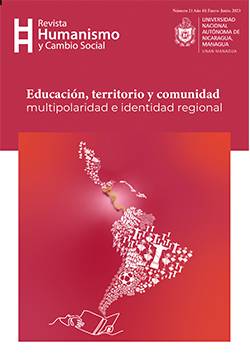Legal regulation of telework in Nicaragua, Costa Rica and Panama (Comparative analysis)
DOI:
https://doi.org/10.5377/hcs.v21i21.16766Keywords:
Comparative Law, Legal Void, Legislation, Labor Regulations, TeleworkAbstract
Access to new technologies, changes in the market system, and, since 2020, the COVID- 19 health crisis have led employers in many parts of the world to adopt teleworking as a work modality. This new form of work, along with other social transformations imposed by globalization, demands legal regulation of teleworking and other forms of remote work, also known as “work from home.” This essay presents an argumentative analysis of labor guarantees under Nicaraguan legislation using comparative law. This approach facilitates analogous comparison of labor norms through legal interpretation and analysis, leading to a discussion on the necessity to regulate teleworking modalities in accordance with international socio-legal labor advancements. In this work, a comparative analysis is drawn between legislative practices in Costa Rica and Panama. Additionally, it aligns with UNANManagua’s research agenda on the relationship between the State and society. It aims to contribute to the National Plan to Combat Poverty and Human Development (PNLCP-DH2022-2026) by proposing an initiative to regulate telework in the country.
Downloads
343
References
Castillo Guido, O. (2016). Orígenes del Derecho del Trabajo Nicaragüense. https://revistasnicaragua.cnu.edu.ni/index.php/revciejupol/article/view/7138/8660
Código de Procedimiento Civil de la República de Nicaragua [CPCRN] 07 de noviembre de 1905, (Nicaragua). http://digesto.asamblea.gob.ni/consultas/util/pdf.php?type=rdd&rdd=MEeSlMWplqg%3D
Constitución Política de Nicaragua, con sus reformas incorporadas [CPN]. 18 de febrero de 2014. La Gaceta, Diario Ofi cial No. 32.
CPN. (2006). Constitución Política de Nicaragua [CPN]. HISPAMER.
Constitución Política de Costa Rica [CPCR]. 07 de noviembre de 1949. Costa Rica.
García Álvarez, Manuel (1991). Constituciones extranjeras contemporáneas. Tecnos.
Esgueva Gómez, A. (2000). Las constituciones políticas de Nicaragua. T. 2. Instituto de Historia de Nicaragua y Centroamérica (IHNCA).
Guevara, O. y Pérez C. (2000). El Movimiento obrero en Nicaragua. El Amanecer.
Ley No. 9738. Por la cual se regula el teletrabajo. 18 de septiembre de 2019. http://www.pgrweb.go.cr/scij/Busqueda/Normativa/Normas//nrm_texto_completo.aspx¨?param1=NRTC&nValor1=1&nValor2=89753
Ley No. 126. Que establece y regula el teletrabajo en la República de Panamá y modifi ca un artículo del Código del Trabajo. 18 de febrero de 2020.
Ley No. 85 de 1996. Por la cual se crea el Código del Trabajo de Nicaragua. Promulgada el 5 de septiembre de 1996. La Gaceta No. 205.
Ley No. 2 de 1943. Por la cual se crea el Código del Trabajo de Costa Rica. 26 de agosto de 1943.
Gobierno de Colombia (2021) Teletrabajo incluyente y seguro. https://www.teletrabajo.gov.co/622/w3-article-14801.html
Newson Linda A. (2021) Supervivencia indígena en la Nicaragua colonial. Traducción de Adolfo Bonilla. University of London https://library.oapen.org/bitstream/handle/20.500.12657/55752/1/9781908857873.pdf
Pulido, M. L. (2019). La hermenéutica jurídica desde la perspectiva fi losófi ca. Anuario de la Facultad de Derecho. Universidad de Extremadura, (35), 481-532.
Veliz, C. (2021) ¿Laguna jurídica https://laley.pe/art/11270/cual-es-la-diferencia-entrevacio legal-y-laguna-juridica
Downloads
Published
How to Cite
Issue
Section
License
Copyright (c) 2023 Universidad Nacional Autónoma de Nicaragua, UNAN-Managua

This work is licensed under a Creative Commons Attribution-NonCommercial-ShareAlike 4.0 International License.




